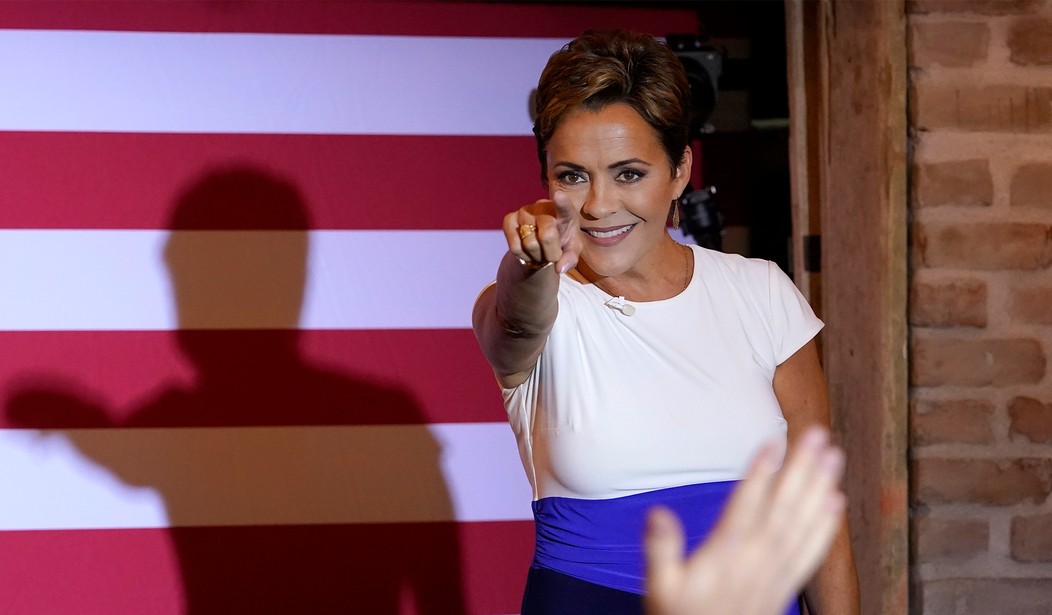The Arizona gubernatorial race has been one of mounting import for the coming midterms, as it is becoming reflective of all the problems the Democrats are facing and the growing tide of Republican support. Add to the fact that the GOP nominee, Kari Lake, is an unapologetic Trump acolyte, and you have a referendum in play on one of the key issues Democrats have attempted to leverage.
Once thought of as a secure win for the Democrat Katie Hobbs, polls now show Lake in the lead, as Hobbs has been shown to be a weak campaigner, one who has consistently refused to debate Lake. This has proven to sway impressions of Hobbs and might also have been the wiser move.
Her avoidance of Lake is understandable, as she would be dealing with someone with years of media knowledge and savvy on the microphone. The longtime news reporter has also shown she is more than just comfortable on camera. Lake is adept at handling the press. When faced with numerous biased questions, she has displayed her ability to parry and turn the tables on the reporters challenging her. This media dexterity brought out a compelling point when she made an appearance with Tucker Carlson on his Monday evening broadcast.
Carlson introduced their segment by noting a recent endorsement of Hobbs by onetime Republican stalwart Liz Cheney and how that campaign tout has ended up paying dividends for Lake instead. But then the gubernatorial candidate segued to a broader point about the media, and it is a salient message. Lake noted that our current media complex is not exploring and exposing truisms but is instead in the process of telling us what we are forbidden to mention.
This is the state of our current media complex that they are in need of dictating not just what they will cover as essential news, but they work to limit what topics are to be discussed.
Kari Lake makes some trenchant comments about the state of our media complex and how those who subsist on the 1st Amendment are keen to stifle subjects from being discussed.https://t.co/T2JvmVjvkh
— Lie-Able Sources (@LieAbleSources) November 1, 2022
Recommended
She is exactly on point with this matter because we have seen repeated examples of those in the business of delivering information seeking to silence the spread of "disapproved" information. The Hunter Biden laptop story is a shining beacon of the press working diligently to kill off a legitimate story they collectively deemed unfit to cover. It is a practice we have seen repeatedly.
On the Paul Pelosi story, I was in an argument with Max Boot over that issue as he strained to make the attack a political hit on Republican messaging. As Boot attempted to make it evident of political violence from the GOP leaders, I gave him a truncated list of violence from the political left that went unrecognized. There have been dozens of pregnancy centers targeted and numerous individuals on the receiving end of political violence – just this year alone.
Last week a Marco Rubio canvasser was sent to the hospital.
— Brad Slager: Polling For Soup (@MartiniShark) October 31, 2022
Last month an 18-year-old Republican was run down over politics.
A Glenn Abbot volunteer was assaulted recently.
A reporter was killed by a Dem. state politician for ruining his primary run.
But do go on... https://t.co/8hje7cY0rC
Lake's accurate point is an extension of something else that has been a perplexing development in the press circles. Members of the media, who subsist on the very concept of the First Amendment and whose industry has basically been enshrined as the Fourth Estate to maintain a check on the government, have in recent years cheered the chilling effect of silencing individuals or entities that pose a threat to the state. From Donald Trump's Twitter ban to Parler's de-platforming, many news outlets and journalists have cheered this third-world practice.
The "danger" of daring to ask questions about Covid has led to numerous accounts being silenced. We perversely watched Brian Stelter and Oliver Darcy at CNN outwardly campaign to see InfoWars silenced as an outlet. It has become a part of the ongoing narrative about "the threat to democracy," where that ill-defined phrase is trotted out to justify censorious actions. It is being seen in the shrieks from the press today over Elon Musk taking over Twitter and his promise to free up the discourse on that platform. The press has shown a tendency to abhor free expression because if there is a national discourse, it means their monopoly on the news narrative is slipping away.
This also exposes the bias in the journalism ranks, as they seek to manipulate the approved news cycle on behalf of one party. This, too, is seen in Kari Lake's campaign. One Arizona paper falsely attributed a quote from the candidate to mean she calls for Arizona to secede from the union, and it then weaved a fantasy as to the ramifications on Arizona should the impossibility ever occur. The Hobbs campaign then used this column to declare it was Lake's policy.
The prime example of the silencing nature was also seen in Arizona when a campaign office of Hobbs had been broken into weeks ago. Hobbs' campaign manager blamed the break-in on Lake inciting the act, and the press gleefully ran with this storyline. Later, once it was learned that an illegal immigrant was behind the incident, the press fell completely silent and would knock down any further discussion of the break-in. Using the crime as a way of discussing the immigration challenge was basically rendered a forbidden topic.
Kari Lake's words are a recognized reality and, at the same time, a revelation. Something that is inherently realized also is given clarity once the words are actually heard. It is almost as if the forbidden phrases are suddenly released and become more tangible. We just need more ears to absorb and digest the reality.























Join the conversation as a VIP Member